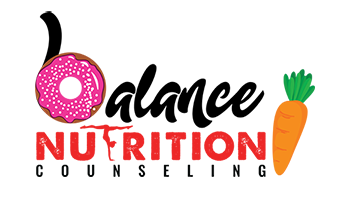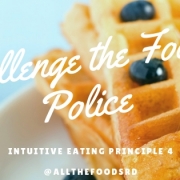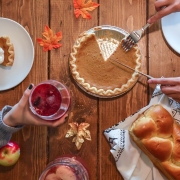5 Reasons To Move Away From The Scale
If you find yourself thinking about your weight frequently, maybe that looks like several times week, once a day, or even more than that, than you are not alone. The scale can play a huge role in a person’s life, even without being aware of it at times. A common trait found in a lot of individuals who struggle with eating disorders or disordered eating is an obsession with numbers. This is by no means just confined to the numbers on a scale, but the scale is usually one of many of these metrics. This can also go beyond individuals with eating disorders. Unfortunately, the culture we live in today puts a lot of emphasis on body size with the notion that smaller is better. Giving your body the nutrition that it needs and being able to enjoy the food you are consuming every day is the best thing you can do for your body and your relationship with food. The scale only complicates this process. Despite the common notion that it can help you reach your goals, more often, it does the opposite. Below are 5 reasons that may be helpful to consider when deciding if consistent use of the scale is beneficial to you in your journey towards finding a healthy relationship with your food and body.
1) There is no endgame. If you are not sure what this means, I would recommend asking yourself what the number on the scale is that you are wanting to reach and having an honest conversation with yourself to see if you would be satisfied once you reach it. What changes when you do reach your goal weight? Are you going to be stuck in the same cycle of restriction trying to maintain this number? Is it sustainable for you and your body? It can be common, especially within diet culture, to find motivation or lose motivation from seeing the number on the scale. If you relate with this, what happens when you’re no longer getting that external source of motivation? Do you have enough internal motivation to continue doing everything you are currently doing without the satisfaction of seeing the number on the scale drop? Usually, due to the rigidity and strictness of any form of restriction or diet, it is almost impossible to continue long-term without having a short-term goal being met. Without these external, short-term goals, you might not feel the same sense of control or satisfaction and you may feel tempted to keep setting new goals to satisfy.
2) What is the scale taking away from you? This will be different for everyone, but usually it does not stop at just frequent weighing. Usually that will bleed into other activities throughout the day. If you know you are going to be weighing yourself that day, it is common to start adjusting your behaviors around nutrition and exercise beforehand. As I previously mentioned, various number driven goals can fuel disordered eating behaviors. If it wasn’t fueling anything, you would, more than likely, not have the desire to weigh as often, or even at all. For this reason, checking the scale frequently is usually followed by obsessive behaviors involving increased food thoughts, calorie counting, body checking, overexercising, and many other behaviors that can start to take space in your daily routine. If this resonates with you at all, I recommend asking yourself if these behaviors are life-giving or life-taking behaviors? How much of your daily life is affected by these behaviors and how much of your daily life do you want to be affected?
3) Daily fluctuations in the scale will happen, no matter what. If body weight could be controlled solely through decreasing food intake, eating disorders would not exist. A person’s food choices may or may not lead to weight changes, and any weight changes that do occur are not always sustainable. Two people can eat the exact same thing and, due to genetics alone, their body sizes might look completely different. Weight is not something that can always be controlled, and despite what diet culture might say, restriction is not the answer. In addition to this, there are several other uncontrollable factors outside of just food intake that can cause the human body to fluctuate in weight day-to-day. Not only that, but it is our bodies’ job to keep us alive and because of this, it will make adjustments to help keep us alive if our nutritional needs are not being met. If you are not giving your body enough nutrition, over time your metabolism can slow down, your production of both hunger hormones and stress hormones can increase, and you might start holding on to food instead of it being put to use to help assist in carrying out varies tasks in your body.
4) The focus is on weight over health. With society telling us that a smaller body size is better, a lot of privilege is associated with those who fit into this mold. Weight loss is deemed as a good thing and is often perceived in a way that shows you are taking care of yourself. A lot of times health is disguised as restriction, and that is not truly what is healthiest for our bodies. Since genetics alone can play a large role in determining someone’s body size, regardless of their diet, it is not always a choice whether to gain or lose weight. Likewise, you are not doing something wrong if you gain weight and you are not doing something right if you lose weight. Not to say that the reverse cannot be true as well, but if you are wanting to truly do what is “healthiest” for your body, providing it with regular, balanced meals and snacks throughout the day, as well as honoring your hunger/fullness cues is the best way to do that. In addition to this, reliance on the scale can also lead to other negative health impacts such as increased negative body image thoughts, therefore worsening disordered eating, along with increased rates of anxiety and depression.
5) Effects the scale has on your relationship with food. After discussing all the behaviors that can come from reliance on the scale, it can make it very hard to enjoy certain foods without thoughts of guilt or shame that might come along with it. Sustainability is hard to set as a priority when your focus is on the number that the scale might read when you get on it next. It is not sustainable to cut out all “junk food” because generally what someone deems as their “junk foods” are the foods they enjoy the most. And contrary to what diet culture might say, food is meant to be enjoyed! Food is meant to be social and can bring people together in so many ways. When you start to associate morality to foods, meaning that you categorize some as good and others as bad, it begins to take the enjoyment out of them when you do eventually allow yourself to eat them. If you start having increased thoughts of guilt and shame while eating, it can make it really challenging to be present and enjoy these foods. When this happens or when you haven’t had a food that you really enjoy in a while, you might want to eat it larger quantities or eat it more often. This creates a cycle leading to more guilt and shame, thus further worsening your relationship with food.
So, can you step away from the scale? What will it take? Consider what you are losing by focusing on the scale. If you feel you need support with this we are here to help!
Balance Nutrition Counseling is accepting new clients virtually in many states as well as in person in Nashville and Murfreesboro, TN! Contact us here to learn more.
By: Jess Lechman, MS, RDN, LDN









